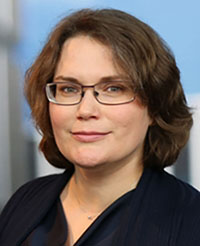Her group combines ground- and space-based observations and radiative transfer models to trace how the molecular building blocks of life evolve from their origins as ices in dense molecular clouds to their incorporation into rocky planetesimals and young protoplanets embedded within protoplanetary disks. She is the PI of the three JWST Cycle 1 programs (~75 hours) dedicated to this theme: the Early Release Science program, "Ice Age", and two GO programs, "It's COMplicated" and "MIDAS". Observational results from these three programs will be directly comparable with laboratory experiments and theory in InterCat's Themes 3 and 4.

+31 71 527 5737
mcclure@strw.leidenuniv.nl
Work address: Leiden Observatory / HL516c
Visitor address: Niels Bohrweg 2, NL-2333 CA Leiden
Postal address: PO Box 9513, NL-2300 RA Leiden
My research aims to understand how complex organic molecules (COMs) are formed and distributed in regions where stars are formed. To achieve this goal, I have used particle accelerators in France and synchrotron light (Brazil) sources to study the formation of COMs via energetic processes. Next, I derived the refractive index of these molecules and used them to interpret space-based (ISO, Spitzer) spectra of protostars. For the next Era, I focused on the development of new approaches to interpret those observations, which resulted in an artificial intelligence technique to find spectral signatures of COMs in space - the ENIIGMA code. Some highlights of my past research are: (i) there is evidence of energetic processing of ices toward protostars and (ii) the external irradiation field of OB stars modify the ice reservoir extent in protostellar envelopes. Currently, I am providing the astrochemical community with a comprehensive database of laboratory data and tools to be used in the next Era with JWST. With JWST, I will contribute as PI and Co-I of different proposals, to enlarge the amount of COMs detected in star- and planet-forming regions, as well as will provide essential laboratory data for those discoveries.